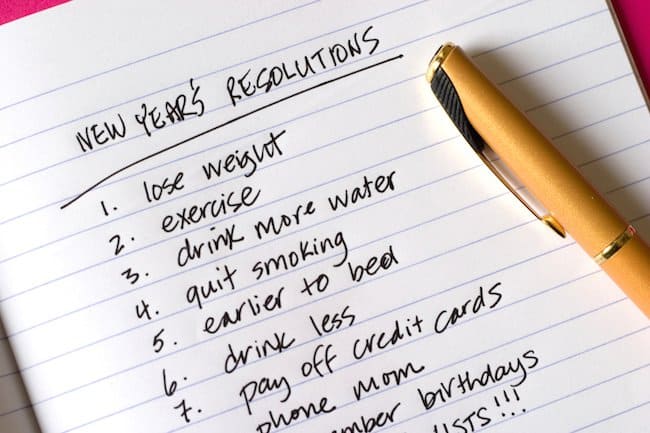
According to data from the University of Scranton, about 45% of Americans usually make New Year’s resolutions. Of the number of people who make resolutions, only 8% of people are successful in achieving them.
Why is the success rate for New Year’s resolutions so low? There are many reasons people don’t achieve their goals. A big factor is the sharp decline of sticking to new habits after the initial first few weeks.
In order for someone to hit their goal, it usually takes months and months of change.
Here are some practical tips to help you set New Year’s resolutions you will stick with.
Have accountability
Instead of trying to make a change on your own, tell supportive people around you. Having accountability can increase your consistency, and others can help encourage you when you feel like quitting.
If you tell people your goals, you may inspire others to make the same goals. This can be even more beneficial if you have someone to work towards a common goal together.
For example, if your goal is weight loss, you could work out or implement diet changes with a friend or family member with the same goal.
People who know your goals should feel the freedom to ask you about your goals, and they should encourage you without making you feel ashamed or like a failure if you get off track.
The application of having strength in numbers relates to many aspects of life, and it can also apply to reaching your goals.
Write it down and look at it
Instead of thinking of a vague goal in your head for the New Year, write something tangible down on a piece of paper.
Writing goals down can help enforce your vision and direction throughout the year.
Another key tip for setting goals is to look at the goal on a consistent basis. After you write a goal down, put it somewhere where you will be reminded of it often.
Don’t give up
The first few weeks of reaching your goal may be fairly easy because it is new and you are motivated.
However, after the newness wears off and the daily grind of life obstacles get in the way of you and your goal, it’s easy to lose focus.
A tip for sticking with a New Year’s resolution is to expect setbacks and failures.
Don’t let setbacks stop you from your goal. Get back up and keep going forward, don’t stay down.
Make an action plan of what you will do if you get off track of reaching your goal.
Find your motivation for reaching your goal. The 8% of people who reach their goal probably really wanted it. They didn’t let setbacks get in the way of reaching where they wanted to be.
Reward yourself along the way
If your goal is a lofty one, set up smaller goals along the way for the year. Sometimes breaking up a larger goal into smaller more tangible goals is easier to conquer.
Once the small goals are reached, it’s ok to give yourself a reward. Rewards can be very motivating!
For example, if your goal is to lose 50 pounds this year, break it up into what you need to do every month. After each 10 pounds you lose, treat yourself to something you like.
It could be a massage, movie, new clothes or something non-money related like having your significant other agree to clean the house for you when you hit your mini goals.
This can give you extra motivation to keep going with your progress.
Make a plan and be realistic
Don’t just set a goal and write it down. This is a great first step, but after this figure out how you can get there. What are some practical steps you need to take?
What are small (or big) things you can change in your own environment to help you reach your goal?
Write down your plan and what you will do if certain road blocks come up.
Evaluate your goal and your plan. Is something you can and are willing to commit to? Your goal should be challenging but is should be realistic at the same time.
Conclusion
Setting goals is common to do around the New Year. However, most people don’t reach their goals long term.
There are many tips you can implement to your goal setting that can help you actually succeed with your goals.
Having accountability can be a net of encouragement and accountability when you feel like quitting along the way to your goal.
Writing a goal down and constantly looking at it can keep your goal fresh in your mind and increase likelihood of success.
Resolve not to give up when it gets hard and have a plan in place of how you will reach your goal and what you will do when you get off track.
Setting up rewards along your journey can provide a boost of determination and renew drive. Last but not least, from a practical plan for how you will reach your goal.
References used in this article










